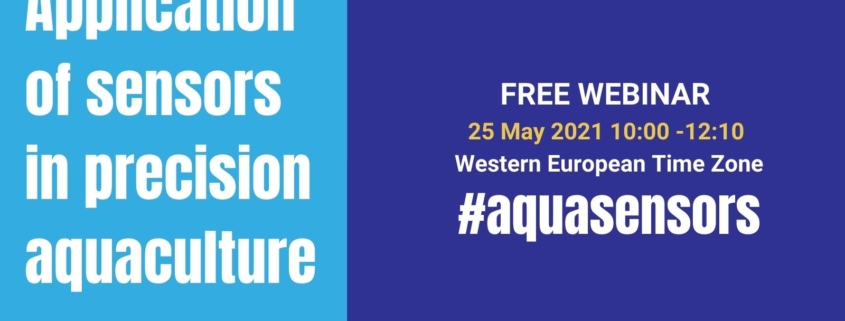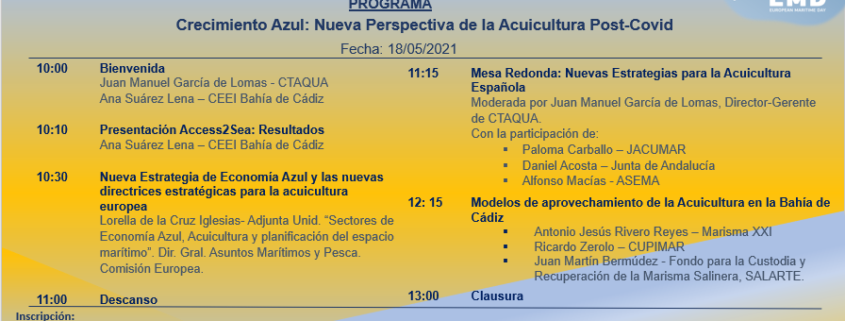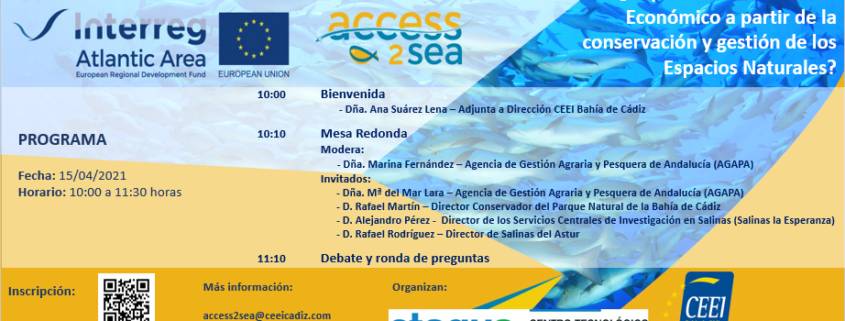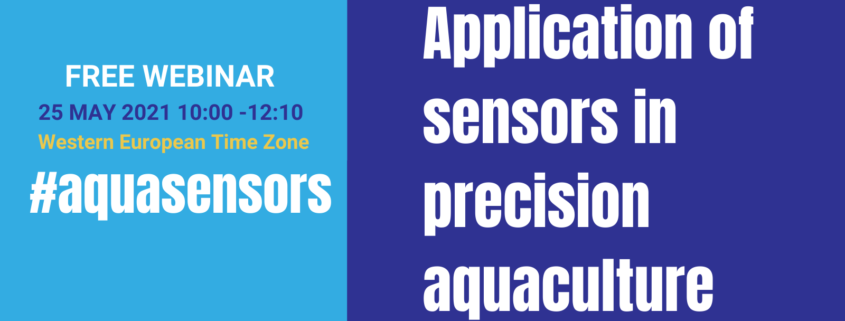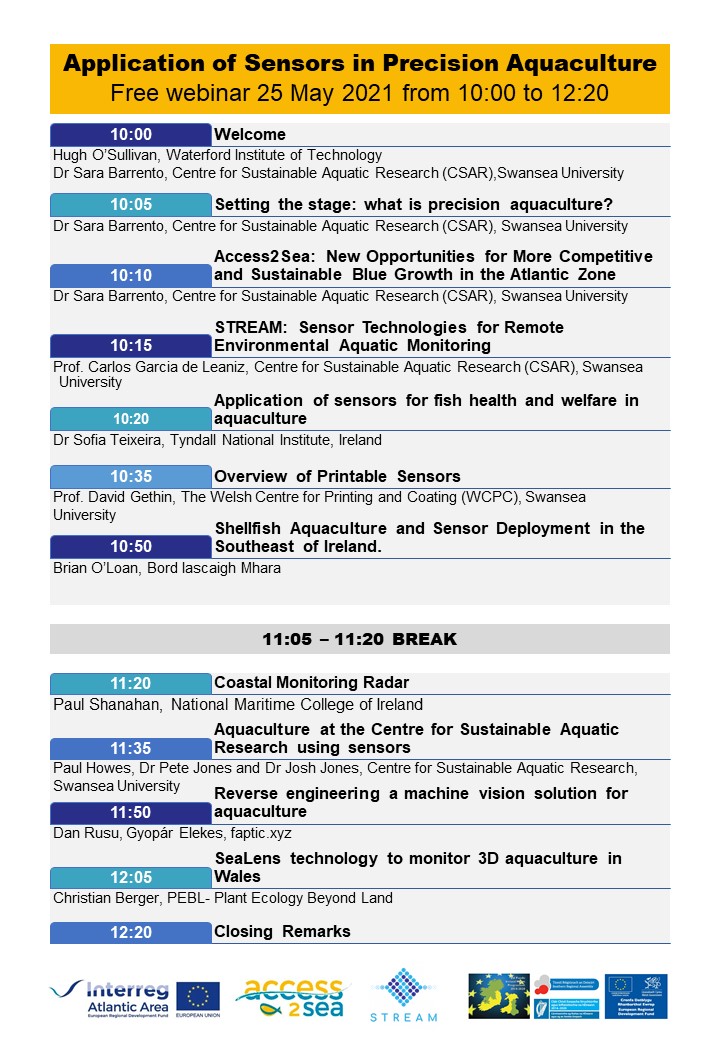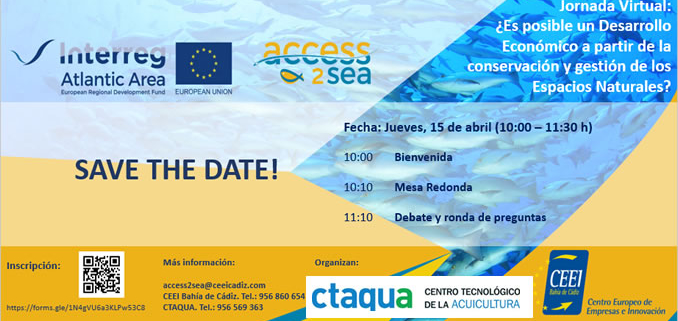Togra Mara Access2Sea: Call for Expressions of Interest/Application launched
Pilot project IRELAND
The application process for Access2Sea’s Ireland pilot project is now open, the deadline for receipt of applications is July 7, 2021 @4pm local time. Click below to download Gaeilge and English application forms.
Léiriú Spéise ACCESS2SEA Gaeilge 110621
Expression of Interest ACCESS2SEA_Eng 110621
Background
The information below is an excerpt from the programme manual for Access2Sea explaining the pilot Action 3’s stated objective to “…manage a pilot marine site in Ireland to demonstrate innovative, technology-led and cost-effective models and practices to add value to aquaculture products in a sustainable manner.”
To that end, the application/expression of interest form has called for:
“Expressions of interest containing elements of cold storage, algae drying and ice facilities as described in the project manual, http://access2sea.eu/togra_mara as well as innovative technologies would be welcomed.”
Programme Activities
Údarás na Gaeltachta will assume responsibility for managing the development of a marine pilot-site in Ireland. Through providing dedicated infrastructure, facilities and services, this development initiative will add value to aquaculture products in a sustainable manner drawing on the endogenous marine development resource within the region.
Through the programme implementation, Údarás na Gaeltachta will build effective collaborative partnerships with private sector enterprises and industry-led sectoral clusters trading in national and international aquaculture markets.
The pilot project will be located in the Atlantic coastal districts of Ireland’s Gaeltacht regions. The project will integrate the effective combination of renewable energy and smart technologies and develop a series of valorisation protocols which will be both scaleable and replicable across other rural and coastal development environments. The dissemination strategy will target industry stakeholders, sector-wide consortia and public development agencies with a marine-resource development remit.
WP7 PILOT SITES
Action 3: Sustainable aquaculture activities Pilot Project (IRELAND: ÚDARÁS + WESTBIC)
In collaboration with its business development partners at Westbic, and in association with marine enterprises of regional scale and significance which will be drawn from the Údarás na Gaeltachta’s current client base, the agency will develop and manage a pilot marine site in Ireland to demonstrate innovative, technology-led and cost-effective models and practices to add value to aquaculture products in a sustainable manner.
Actions:
- Identify and recruit companies located within the Gaeltacht region trading in aquaculture products (algae, finfish or shellfish).
- Building on the sector-specific commercial and enterprise development knowledge-base which will be developed under WP 6, and based on the scientific and technical input from other partners delivering on the objectives set out in the other WPs, the agency will identify and prioritise those developments which demonstrate clear capacity to deliver new valorisation opportunities within the aquaculture supply chain.
- In conjunction with industry partners, and through deploying renewable energy and smart technology design, the agency will build and commission a bespoke unit to include a cold room, a dryer for algae, an ice plant for fish. These infrastructure and facilities will maximise the quality, viability and shelf-life of the goods.
- Through working with scientific partners drawn from the regional HEIs and marine research and development agencies, the agency will link with regional industry stakeholders to undertake a demonstration project aimed at developing innovative and efficient techniques to add value to aquaculture products.
- Monitor, document and evaluate the process outputs generated through the investment in the pilot marine site
- Provide customised training interventions targeting marine industry stakeholders to develop skills, knowledge and capacity at industry level in relation to the valorisation of products
- Profile the pilot project as a demonstration initiative with relevance to the aquaculture sector within the region, throughout Ireland and amongst the broader regions from where the consortium partners are drawn
- Identify the possibilities for scaling-up and replicating the pilot project by examining the technical dimensions of the process, the cost benefit analysis and the return on investment measures which the project will generate with a view to establishing a larger scale, commercial plant in the medium-term
- Document the process and the results of the marine pilot site through the production of a technical factsheet as part of an overall case study report which will examine the commercial and technical feasibility and potential impact of future investment on a larger commercial scale
- Communicate this knowledge to other partners and stakeholders in the other regions of the project through partner meetings, site visits, media website and other media platforms.
- Disseminate the results of the marine pilot site through various marine fora.

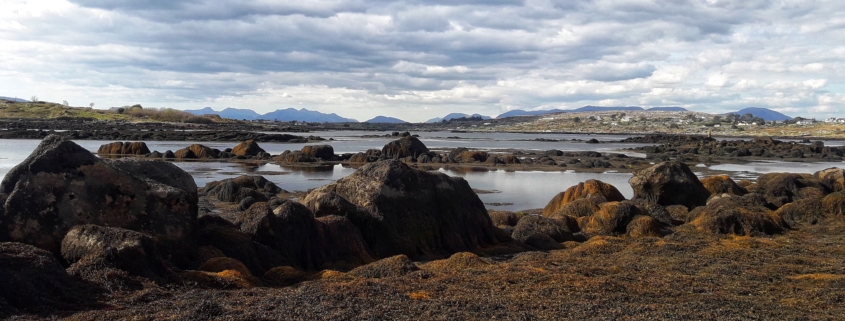
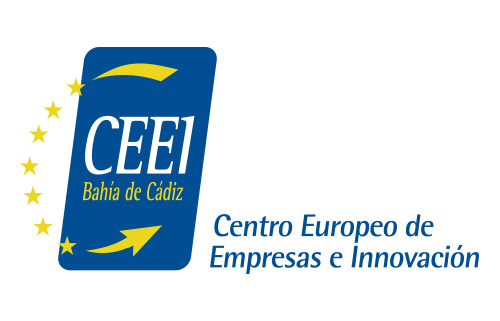
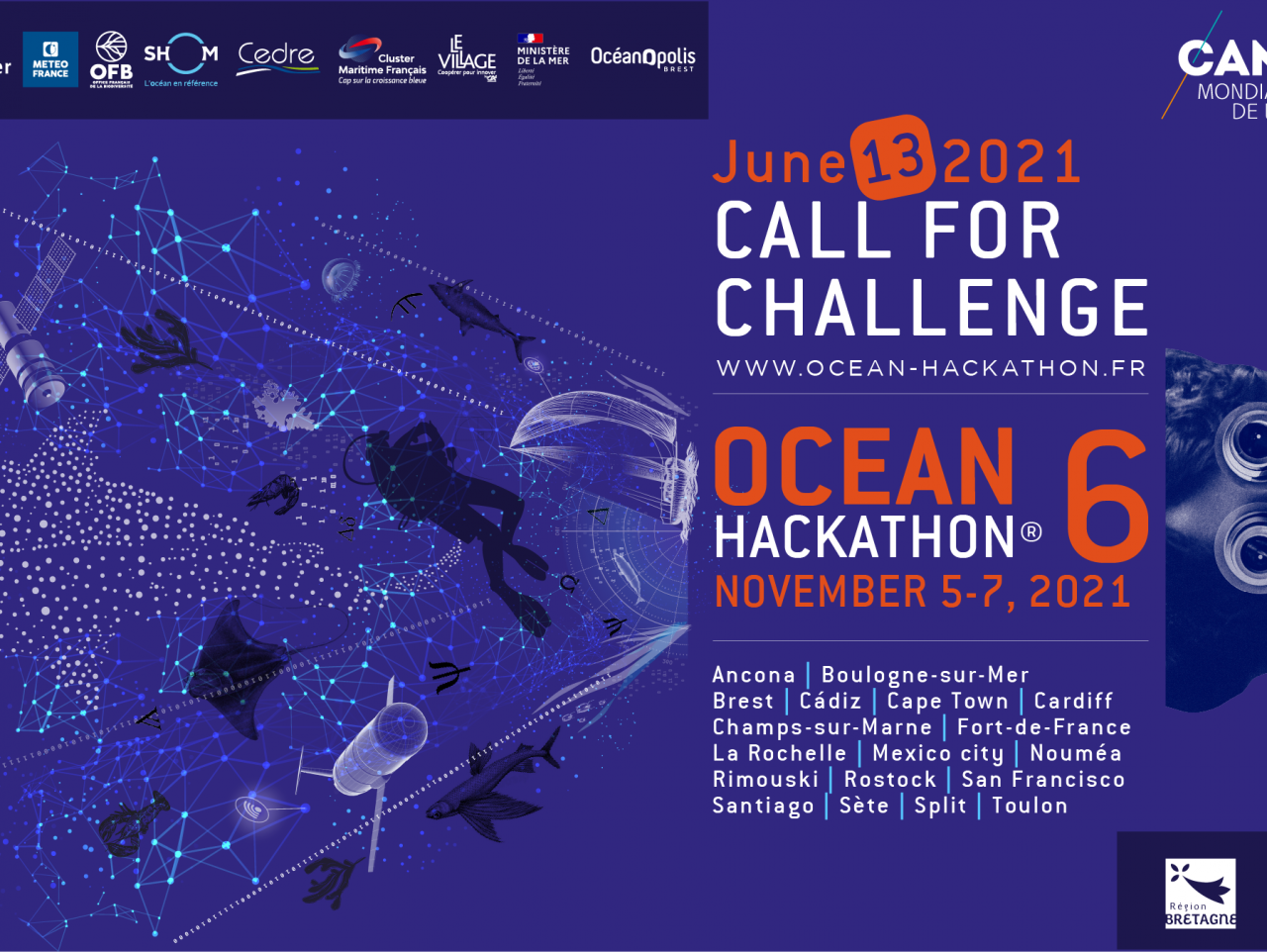

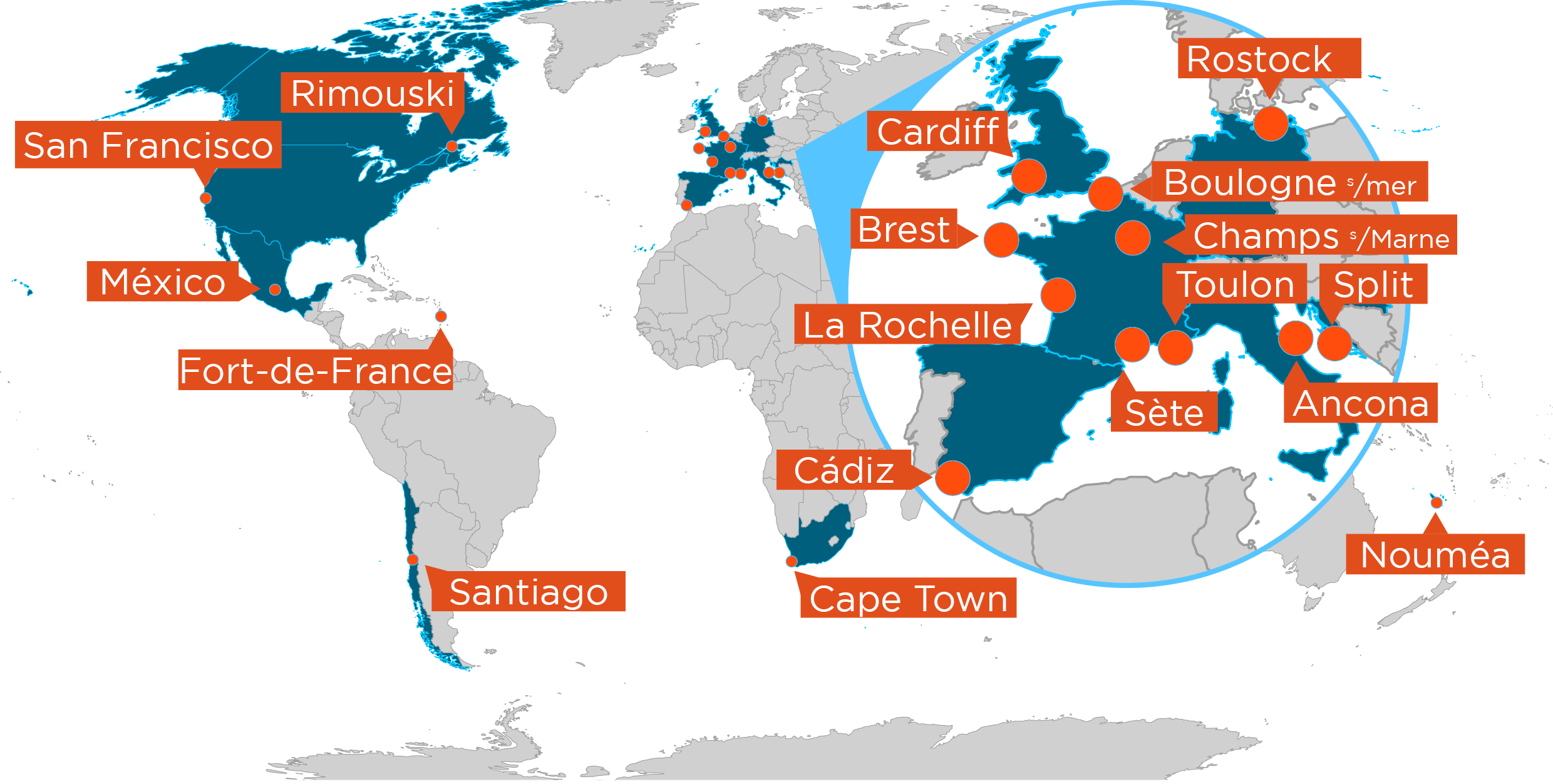

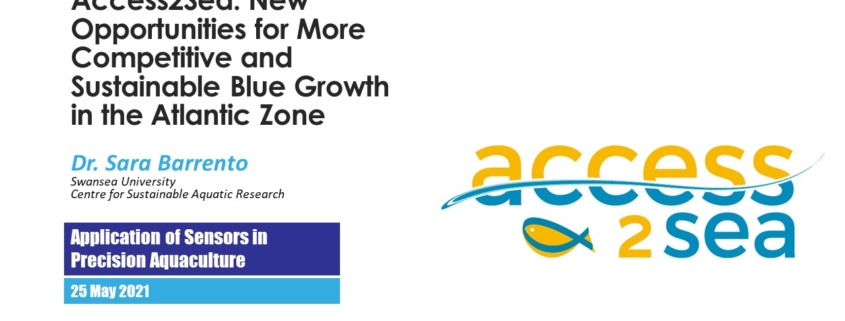
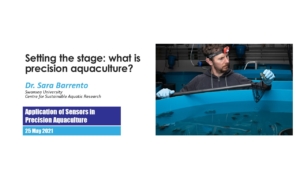 Dr Sara Barrento, marine biologist and science communicator at CSAR, introduced the topic and noted that the motivation behind precision aquaculture relates to developments in real-time sensor technologies, linked to the need for sustainable management when farms are getting bigger, moving further offshore, and aiming towards restorative aquaculture.
Dr Sara Barrento, marine biologist and science communicator at CSAR, introduced the topic and noted that the motivation behind precision aquaculture relates to developments in real-time sensor technologies, linked to the need for sustainable management when farms are getting bigger, moving further offshore, and aiming towards restorative aquaculture.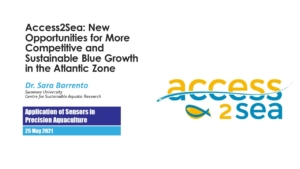
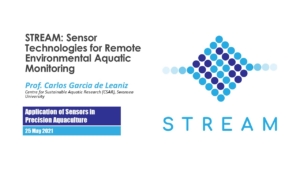 Prof. Carlos Garcia de Leaniz, director of the Centre for Sustainable Aquatic Research, Swansea University, introduced the STREAM project: Sensor Technologies for Remote Environmental Aquatic Monitoring. The project aims to monitor the Coastal and Estuarine environment around both Ireland and Wales using affordable sensors to support local coastal activities including aquaculture.
Prof. Carlos Garcia de Leaniz, director of the Centre for Sustainable Aquatic Research, Swansea University, introduced the STREAM project: Sensor Technologies for Remote Environmental Aquatic Monitoring. The project aims to monitor the Coastal and Estuarine environment around both Ireland and Wales using affordable sensors to support local coastal activities including aquaculture.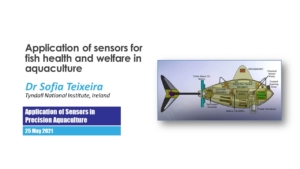 Dr Sofia Teixeira of Tyndall Institute in Ireland presented smart sensors for wellness and health in aquaculture. These sensors are non-invasive and provide rapid tests to monitor health by measuring indicators, such as cortisol and other parameters, that have wide applications in the assessment of immune competence, stress, growth, and behaviour.
Dr Sofia Teixeira of Tyndall Institute in Ireland presented smart sensors for wellness and health in aquaculture. These sensors are non-invasive and provide rapid tests to monitor health by measuring indicators, such as cortisol and other parameters, that have wide applications in the assessment of immune competence, stress, growth, and behaviour.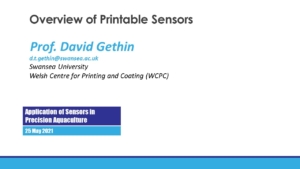 Prof. David Gethin, of the Welsh Centre for Printing and Coating (WCPC), Swansea University, gave a brief overview of commercial sensors and highlighted the benefits of printable sensors – they are less expensive and can measure a range of parameters in an integrated system. But printable sensors need to be calibrated against laboratory and commercial devices, and their durability still needs to be tested and improved. Prof. Gethin also provided an overview of printing methods and sensors being developed in the STREAM project.
Prof. David Gethin, of the Welsh Centre for Printing and Coating (WCPC), Swansea University, gave a brief overview of commercial sensors and highlighted the benefits of printable sensors – they are less expensive and can measure a range of parameters in an integrated system. But printable sensors need to be calibrated against laboratory and commercial devices, and their durability still needs to be tested and improved. Prof. Gethin also provided an overview of printing methods and sensors being developed in the STREAM project.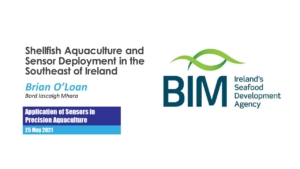
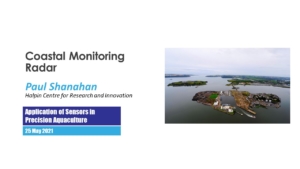 Paul Shanahan, of the National Maritime College of Ireland, highlighted the advantages of the radar system to provide accurate local weather information which can be disseminated to social media. He explained the type of radar used, its main operating characteristics, and the location of the deployment sites in Ireland. In 2022 it is expected a radar system to be deployed in Swansea, Wales.
Paul Shanahan, of the National Maritime College of Ireland, highlighted the advantages of the radar system to provide accurate local weather information which can be disseminated to social media. He explained the type of radar used, its main operating characteristics, and the location of the deployment sites in Ireland. In 2022 it is expected a radar system to be deployed in Swansea, Wales.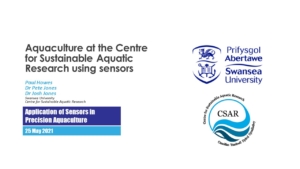 Paul Howes, Manager of the Centre for Sustainable Aquatic Research, focused on the unique facilities and projects taking place in CSAR, using a variety of species from microalgae to fish, and topics such as aquaponics and aqua biotech. Dr Pete Jones focused on experimental lab work using sensors to determining preference and avoidance thresholds for marine organisms. Dr Josh Jones focused on the mapping opportunities and challenges for aquaculture and fisheries, using relevant data from sensors.
Paul Howes, Manager of the Centre for Sustainable Aquatic Research, focused on the unique facilities and projects taking place in CSAR, using a variety of species from microalgae to fish, and topics such as aquaponics and aqua biotech. Dr Pete Jones focused on experimental lab work using sensors to determining preference and avoidance thresholds for marine organisms. Dr Josh Jones focused on the mapping opportunities and challenges for aquaculture and fisheries, using relevant data from sensors.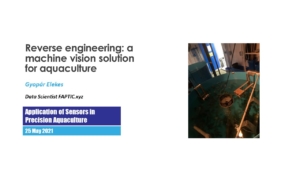 Gyopar Elekes, of faptic.xyz, focused on the use of machine vision technology that can access lumpfish clinging behaviour. The technology uses underwater cameras to record stereoscopic images, the AI and deep learning algorithms allow collecting key data which will then inform on the number of fish, define thresholds for fish density and, in the case of lumpfish, access the proportion of fish clinging and swimming.
Gyopar Elekes, of faptic.xyz, focused on the use of machine vision technology that can access lumpfish clinging behaviour. The technology uses underwater cameras to record stereoscopic images, the AI and deep learning algorithms allow collecting key data which will then inform on the number of fish, define thresholds for fish density and, in the case of lumpfish, access the proportion of fish clinging and swimming.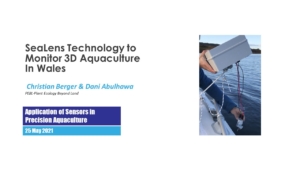 Christian Berger, of PEBL – Plant Ecology Beyond Land, focused on the importance of monitoring low trophic sea farms: the data can be used to inform on the ideal location of new aquaculture sites, create optimized harvest schedules, provide early warning and troubleshooting and validate sustainable objectives (carbon, nitrogen, biodiversity). He presented the SeaLens: a low-cost sea farm monitoring tool and a case study on a proposed seaweed and shellfish farm in Skye.
Christian Berger, of PEBL – Plant Ecology Beyond Land, focused on the importance of monitoring low trophic sea farms: the data can be used to inform on the ideal location of new aquaculture sites, create optimized harvest schedules, provide early warning and troubleshooting and validate sustainable objectives (carbon, nitrogen, biodiversity). He presented the SeaLens: a low-cost sea farm monitoring tool and a case study on a proposed seaweed and shellfish farm in Skye.